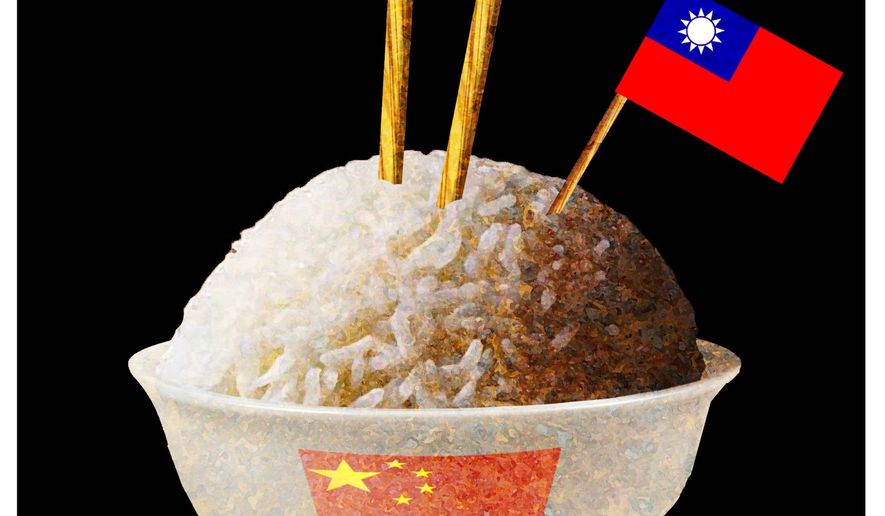OPINION:
“From what happened in Afghanistan, those in Taiwan should perceive that once a war breaks out in the Straights, the island’s defense will collapse in hours, and the U.S. military won’t come to help. As a result, the DPP [Democratic Progressive Party of Taiwan] will quickly surrender,”
– posted by The Global Times on Twitter, which is part of the Chinese Communist Party state-run media.
If the communist Chinese attack Taiwan, will the weak-kneed President Joe Biden unleash the U.S. military to help our ally, or will he do nothing? During the Reagan, Clinton, and Trump administrations, enemy states of the U.S. took no actions that could invite retaliation from the U.S. They probably correctly assumed that it would not work out well for them. The result was that the U.S. suffered very few combat deaths (less than a total of 1000) – all from rogue actors for all three administrations.
China, Russia, and Iran have all made it clear that they covet others. Watching the actions of President Biden and listening to the commentary about his mental condition, are these three countries more likely to now act sooner to achieve their extraterritorial ambitions.
Under Mr. Biden, the odds that the U.S. will do little to protect its allies and even the U.S. have increased but are far from certain. The U.S. military and the leadership of the Democrat party have been deeply embarrassed and hurt by their impotence in the face of obviously disastrous decisions by the commander-in-chief. Many of them are likely to lose their jobs, and if there is another misjudgment by Mr. Biden that they fail to stop, it will almost certainly seal their own fates. It is reasonable to expect that the few remaining adults in the room will bring whatever pressure is necessary on Mr. Biden to keep another calamity from happening.
A military fight over Taiwan would be far more dangerous for the world than military confrontations over the other hot spots. Despite the more aggressive saber-rattling by Chinese President Xi, I expect China will not undertake a military invasion of Taiwan soon.
Taiwan is no Afghanistan. It has a large, well-trained, and equipped military. It is a functioning democracy that protects civil liberties. It is an economic power – with the 20th largest economy globally – and its 24 million people enjoy first-world per capita incomes. It is China’s largest trading and investment partner and the ninth-largest U.S. trading partner.
Taiwan has the world’s most advanced semiconductor industry. Their lead company, TSMC, alone produces about 80% of the world’s high-end chips, and many major global companies like Apple rely on TSMC for Apple’s own products. A naval embargo or invasion of Taiwan that shut down or seriously interfered with Taiwan’s electronics industry would almost certainly cause a profound global recession or depression. It is not only the U.S. and Europe that rely on TSMC chips but so does China.
China and other countries like the U.S. are furiously building high-end chip foundries to reduce their dependency on Taiwan. But each world-class foundry costs billions and takes years to build. If China engaged in a physical invasion of Taiwan that destroyed part of its industrial capacity, particularly the electronics industry, it would shoot itself in the foot. Yes, it would cause great damage to the U.S. and Europe – bye-bye new cell phones and other devices, including cars and trucks – but it would also drive the Chinese economy into a deep recession, thereby undermining its own political stability.
China has been rapidly building up its military, particularly the navy, to increase the credibility of carrying off a successful invasion of Taiwan quickly – but it is not yet there. And as just noted, it is still dependent on Taiwanese semiconductors and other electronics. The Chinese had been preparing for the long game to overcome these deficiencies.
But suddenly, an obviously incompetent U.S. administration has given them an opening that they may not see again. Chinese President Xi has a problem; if he continues to play the long game, he may come under criticism by his colleagues for not taking advantage of a presented opportunity. But while the Biden administration may be incompetent, it is also unpredictable because of all the U.S. internal political forces pushing from various directions. If Mr. Xi overplays his hand, the whole situation could backfire – leaving China and the world in an even more unstable and destructive mess.
There are constructive things that the U.S. could do to temper potential aggressive moves by the People’s Republic of China. First, it needs to be more forthright in its statements of support for Taiwan, backed up by a speedup in delivery of already agreed-upon weapons purchases by the Taiwanese. At the same time, the U.S. needs to be more proactive in reaching trade agreements on several fronts with India, thereby strengthening their economy and their ability to offset aggressive Chinese moves. The Philippines has begun to move back towards the U.S. and away from China. The U.S. should be aggressive in supporting those changes to have a stronger ally in the South China Sea. In sum, the Chinese need to quickly understand that despite the bungling of Mr. Biden, there will be no free lunch for them if they continue to pressure Taiwan or our other Asian allies.
• Richard W. Rahn is chairman of the Institute for Global Economic Growth and MCon LLC.




Please read our comment policy before commenting.